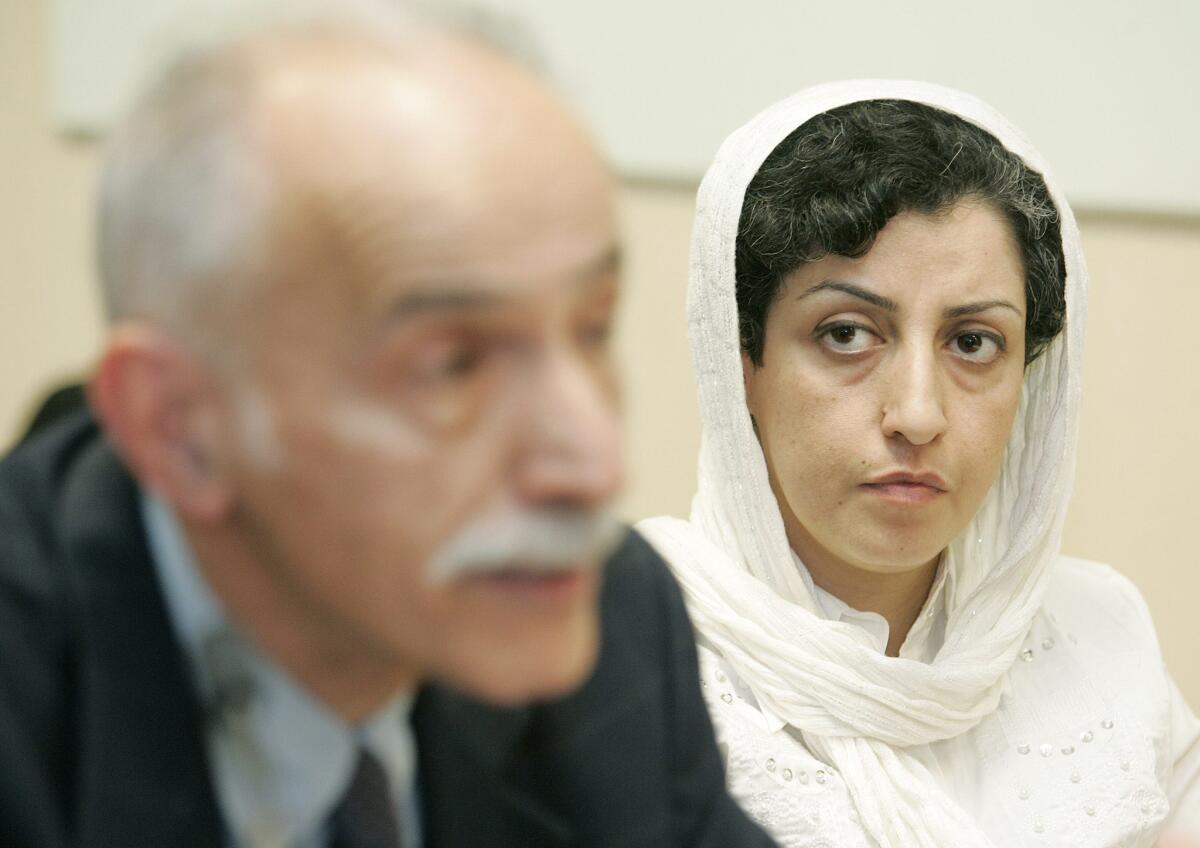Iran upholds 16-year sentence for anti-death penalty campaigner Narges Mohammadi

Reporting from Tehran — An Iranian appeals court on Wednesday upheld a 16-year prison sentence for a prominent Iranian human rights advocate.
Narges Mohammadi had been sentenced in May on charges of violating national security and acting against the Islamic regime through her support of an anti-death penalty campaign.
As vice president of the Defenders of Human Rights Center in Iran, Mohammadi gained attention in 2014 for defending women who had acid thrown on them in the city of Esfahan, purportedly for dressing immodestly.
While jailed this summer at Tehran’s Evin Prison, she staged a 20-day hunger strike in protest of authorities who barred her from speaking by phone with her family.
Mohammadi is mother to 9-year-old twins, who live in France with their father. Friends say she suffers from a chronic illness that causes partial paralysis, which has worsened due to her imprisonment.
The appeals court in Tehran upheld Mohammadi’s sentence following a hearing in the case last week.
“It is shocking for me as a human rights lawyer that a fellow lawyer with children would be sentenced to jail for even one day,” said Nasrin Sotoudeh, a colleague who served three years in jail until being released in 2013.
“She has committed no crime but doing her legal work. Is it wrong to defend the victims of violence?”
Mahmoud Behzadi, Mohammadi’s lawyer, said his client had not decided whether to appeal to Iran’s Supreme Court.
Amnesty International and other human rights groups have assailed Mohammadi’s treatment as an example of how Iranian authorities use broad national security laws to punish dissidents or those seen as hostile to the conservative theocracy.
Human rights activists and dual nationals continue to be imprisoned during the presidency of Hassan Rouhani, a relative moderate whose 2013 election had raised hopes of an easing of Iran’s harsh security laws.
Mohammadi is a supporter of the Campaign for Step by Step Abolition of the Death Penalty, known by its Persian acronym, Legam. Iran is one of the world’s leading practitioners of capital punishment, putting to death an estimated 1,000 people last year, many for drug offenses.
Last month, Iran put to death a teenager who was convicted of a crime when he was 17. Approximately 160 minors are on death row in Iran, according to Amnesty International.
Siavash Ramesh, a 28-year-old political activist, said Mohammadi’s sentence shows the Iranian regime won’t tolerate criticism of its death penalty laws.
“They sentenced her to give a warning to human rights activists and give her a lesson not to trespass against the regime’s imposed red lines,” Ramesh said.
Special correspondent Mostaghim reported from Tehran and Times staff writer Bengali from Mumbai, India.
Follow @SBengali on Twitter for more news from South Asia
ALSO:
Iran’s supreme leader tells former president Mahmoud Ahmadinejad not to run again
As drought grips Iran, farmers lament loss of a way of life
More to Read
Sign up for Essential California
The most important California stories and recommendations in your inbox every morning.
You may occasionally receive promotional content from the Los Angeles Times.










